2017-18 UK Basketball Preview: Full transcript of John Calipari's Q&A
 Here's everything John Calipari said in his preseason roundtable interview.
Here's everything John Calipari said in his preseason roundtable interview.
Q: John, you’re known for having freshmen-laden teams, but how different is this in terms of so many inexperienced players?
A: Well, it’s two. First of all, Wenyen’s playing way better, thank god. So, he’s not the same guy he was a year ago. So, that one guy you have coming back, he can be in that rotation and be fine. The other guys seem to be freshmen. So, that’s one thing: you’re playing freshmen. But the biggest thing is last year, we had like three point guards on the floor almost all the time. Now, you’re going to have either one or none that are true point guards, and that’s going to be the biggest change. So, you may have a team of where it seems like basketball’s going to: no point guard, no center, just players. So now, it’s kind of like – okay, that’s different than what we’ve had. For the last few years, it’s been three guards, and literally, three point guards. Jamal Murray was a point guard, that’s what he is and so, that’s one change. So, what I’m looking at right now is different in how we’re playing and not – we’ll still play fast, we’ll play unselfish. We should be a pretty good defensive team if we choose to be. But how we play offensively, when you talk that kind of team. I’m in the process right now meeting and talking with some NBA guys about [playing] away from the ball. We are a spacing offense and that’s good and we’re not changing that. But you also have to be a movement offense now so that hard cuts – a high motor offense in the half court. In the full court, I’m not worried about it. You’ve got to be able to play that and second thing is, they’re going to play a zone. That’s what I would imagine, either sag man or you play zone. We’ve got to be prepared from day one, okay, probably put in a zone. And this could be a team that should play zone. Whether I play zone, I don’t know. You’re long and big and this could be a good zone team.
Q: It seems like Tony [Barbee] has been chipping away at you, slipping [the zone] in there a little bit year after year?
A: This year, again, I think from day one, we have to have a zone. Start breaking it down, start adding it and then start working on it because we’re going to have to work against it. And if we can play against our own zone, I imagine we can play against anybody else’s. We could play with Nick [Richards], or you could play with one of those other bigs or play with all 6’9” guys. You could play with Hami[dou Diallo] and Quade [Green] – who’s better than I thought he was, which is a good thing. I knew he was good but there were some things because of his size, that I was worried about, but he’s fine. Shai, at 6’6”, you could have two 6’6” guards and three 6’9” guys. What? I mean, that’s – you could say yeah, but you don’t have a center. What? And then, who does? Who has that guy they throw the ball to who can just score in the post?
Q: You said Wenyen right off the top of your head. You didn’t mention Sacha [Killeya-Jones]?
A: Sacha went to England and played for the national team and was there two weeks, but I haven’t seen him play here yet. He and Tai [Wynyard]. I saw Tai over in Egypt. Tai’s better. They’re both better. They’re both better. Nick is probably – looks about seven-feet tall. He’s big.
Q: What held Sacha back last year?
A: He’s young. His age. He’s now the age of a freshmen, right now. This is all new to him. Inexperience. Bam [Adebayo] was better than him. We went to a small lineup so I wasn’t playing two of those bigs together. Derek [Willis] gave us – again, we’re totally different this year – Derek gave us a stretch four at 6’9”. These are playmaking fours. Derek was a shooting four, that’s what he was. These guys are – they can do it on a bounce, they’re not as good as shooter as he was. But they can do stuff off the bounce. So, okay, now, how do you play? Your pick and roll becomes more of an action to get the ball back in the hands of the four so he can make plays. With Derek, it was to get him to the three point line so it would open up for a guard or he could shoot. So, we’re different. I’m not trying to get ahead of myself, but we…there are things that we’re going to have to teach that I haven’t done before here, with this team.
Q: This time, even last year, you were saying with Sacha, 'oh my knee, tendonitis,’ I’m going to have to teach him to push through that stuff. Was that part of the deal with him? ‘Hey, things hurt when you play basketball’?
A: Yeah, way better. There are things they get away with and I’ll still be okay, and then you get behind, it happened to Wenyen. Then you get behind and all of a sudden, every game is on national television and all of a sudden you shoot three airballs and all of a sudden, oh my god, I can’t play them. And then, the season ends. This thing is a daily grind of building your own self-esteem, your own confidence. I can’t build it for you. You work and then you have to have demonstrated performance. If you’re not building your own confidence, more than likely, you’re breaking it down yourself. And by not working, knowing you’re not doing what you’re supposed to, knowing you’re not doing everything and thinking it’s going to be okay, and when it doesn’t happen and things go south, you know it was me. Now it doesn’t matter what I say, what you say, what the fans say – I always come back to that. They build their own self-confidence and they build their own self-esteem. Yeah, we’re there to be positive when we need to be and tell them no when we need to tell them no but at the end of the day, you’ve gotta get in and prove to yourself what you are.
Q: Is Kevin Knox playing guard?
A: Yeah, he is. When you talk about shooters, he might be – he and Jemarl [Baker] might be our best shooters. I want them to drive the ball and have to make decisions. We’ve done some of the dribble drive stuff, but because of these new rules we’ve had to give them time off now. So, the way we’re doing these days, we haven’t started. But he is. He’s good. He’s a good player. He’s young. He just turned 18 so he’s kind of like Michael Kidd-Gilchrist was, and Sacha and Isaac was. They’re really young. They come in, they’re not older that way.
Q: Cal, did [Knox] successfully keep you in the dark as well as any recruit ever has up until he said hey, I’m going to Kentucky?
A: You know, probably. But Hami was really – no emotion, wouldn’t say anything and then call you and say, I’m going to come midseason. What? I thought Hami was important for this class because of his athleticism and his ability to get to the basket. We haven’t mentioned him. He’s – again, what I’m trying to get these guys to understand is none of them are there yet, and if you think you are, you’re delusional, or you really don’t want this. You don’t want the work. Or, you’re delusional. There’s no two – none of the guys are where they need to be. This is going to be one of those season-long – we’ve been through it before. It’s hard. It’s hard to be patient for me and our fans and everybody else, but you’ve just going to have to be. We’re not going to know exactly how we’re playing until February and March. We won’t. But we’re talented. We’ve got a great group of kids. Again, the fantasy campers, two or three campers are with each team. I probably had twenty guys come back to me and say, what a great group of kids. Some of you in the media that met with them the other day said, what a great group of kids. We have that, but it’s just individually, they’re not there yet. Collectively, obviously, we’re not there yet. It’s not just athletically, running up and down the court, it’s how do we play? It’s not exchanging baskets, it’s how do we play to win? They have absolutely no idea. They’re exchanging baskets. You get one, I get one. Watch this! I can’t get one here, you try to get one. I mean, that’s where they are right now and that’s where they should be.They’re a bunch of young kids that were the best player on their high school teams and took all the shots. Now we come in and say, okay, here’s how we’re going to have to play. There are ten of – they want to be coached, they want to win. It’s just going to be that road that we usually take here. It’s going to be hard.
Q: Why is Quade better than what you thought?
A: Quade was almost a walk-it-up point guard, like would get it and have to – he runs the floor like Tyler (Ulis) ran the floor. Now I’m not comparing him to Tyler because that wouldn’t be fair to him, but he runs the court like Tyler did. You guys will say, ‘Wow, he has a lot of those traits of – but that doesn’t get it here. You have to be able to play fast. Pace matters here. And pace matters because we need more possessions. Why do we need more possessions? Because we got more players. We have to get them a minimum number of shots so that everybody gets some shots, to be honest. If we walked it up and took 50 shots, I’m not sure it would work here, what we’re doing. So, I told him that: you have to either spring it or throw it ahead; one of the two. I didn’t see him in a high school game do it, but I watched the rest of his stuff and – so the summer unfolds, we do some workouts, they have some stuff, and he’s playing fast. He’s really sprinting the ball up, he’s throwing it ahead, he gets people involved. He’s got some things to do defensively; you know, be more disruptive and all those things because of his size. But I said to him in front of team before we went home for summer, I said, ‘Quade is better than I thought.’ I said, ‘I didn’t know you were this fast.’ You know what his comment was? ‘I didn’t know either.’ Then I said, ‘So why are you playing like this?’ He said, ‘Because you told me. You told me if I didn’t then I wouldn’t play.’ That’s good for the other guys to hear. So the rest of you understand, you’re going to play the way you have to play for you and us, to be on that floor. And so that was a good thing and for him to be able to tell his teammates that.
Q: Can you play with Shai on the ball some?
A: Yeah, because Shai is not like the pure, you know – Shai can run the point; he’s good. But he’s more of a ‘I’m going to try and get some baskets, I’m going to break this off,’ – that feel to be that position. He’s not to the level of Quade; but, here’s a kid that’s 6-5, he’s long, he can go get baskets, he’s got kind of an old man’s game. Great work ethic. He’s playing, and they can play together or he can play by himself. Or we could play those two and Hami (Diallo) together if you wanted to.
Q: Is it hard to teach freshman defense? Or are these guys so athletic they’ll be good at it eventually?
A: The hardest thing is that on defense is they don’t play every possession and one basket doesn’t matter to them. That’s the typical freshman – you’re not fighting every possession, defensively. You try to make it so hard on them, and if you do and we rebound the ball, we’re not really running offense. If you don’t have it up one side, get it up the other side. It’s an easier way to play, if you defend. Sustaining and effort, and staying in the stance and talking – one of the things that I asked a couple of them, I said, ‘Tell me when you were playing against the Pelicans, what was the biggest thing?’ ‘They talk.’ I said, ‘Yeah, they won like 24 games last year, just know.’ They were like, ‘Man they talk.’
Rondo was talking with Anthony (Davis) how they’re playing pick-and-rolls and they’re talking to each other, and the weakside guys are talking and now these guys are hearing – if you don’t talk, you don’t survive. And if it’s about winning, you will force yourself to talk to each other because you’re trying to win. That’s the hardest thing for young kids to do.
But for me, it’s going to be – if we’re doing new things offensively, if we’re playing away from the ball different than we have –the good news is, none of these guys know. It’s not like I have a whole team that I’m trying to change how we play. It’s a new canvas, this is what I want this to look like. And I’m not sure if it will be right. We’ll try it. We’re going to start this week on Friday and Saturday, for the first time. I’m going to throw in some stuff and just see how it looks.
Q: What were some things you figured out Diallo and Washington can do, and what were some things you’ll need to work on before the season starts?
A: Well most of it’s just getting in great shape. Most of it’s every possession matters and you can’t act like stuff doesn’t matter. Things that I’m not worried about that I can get them to do. Consistency in different areas of their games. What happens to young guys, they don’t know how to truly practice, for example, shooting. So if you’re going to go in the gym and you tip-toe shoot and then you jump shoot and then you tip-toe shoot; and then you get in and you start playing, you shoot it different. Different is how you elevate. It’s okay if it’s a deep shot three to elevate or have a little different shot because it’s a deeper shot, but every other shot you shoot – off the bounce, off a catch, stepping in, two dribbles – you elevate the same way. These guys don’t know that, so now they get in the game and their elevation is different every time they shoot, which means they’re shooting a different shot. You watch a professional player, he shoots exactly the same way every time. It doesn’t always go in, but it is exactly the same every time, and they work on shooting exactly the same shot. So it’s more muscle memory than mental memory. If it’s mental memory, you will go mental. If it’s muscle memory, you have amnesia because you’re not thinking about it. That’s when they say, ‘The dude’s in the zone.’ Yeah, he’s not thinking. They have no idea. PJ, Hami, even Kevin – every shot has to be the same kind of shot.
Q: Did they just never have to communicate until they get here?
A: Yeah, everything is about them. So, you either talk to me, whether it’s defense or offense – you think about Malik Monk’s high school team, he had no one to practice against, and then he probably played two showcase games where someone could play him and give him problems. De’Aaron Fox, the best player on his team other than him was a ninth grader. I can go on. These kids are in situations where they’re not forced to talk. Like I said, you sit on the floor and you’re watching an NBA game, dudes are screaming at each other. It’s not mean, they just gotta talk loud because they have to hear each other. There is so much chatter going on in those games. That’s when a team is empowered. When I talk about an empowered team, they’re talking to each other; they’re really playing off of each other; if something happens, I don’t need to say it, they go to each other. That’s when a team is empowered. This team, they’re probably – you still have this: things will go wrong, will they take responsibility? They’re 17 and 18 years old. Will the people around them have them take responsibility? Oh no. So they’re going to be enabled and they’re going to start blaming; that’s what we do.
I put up an excuse board sometimes with some teams. You know what I’m talking about? So I number 10 excuses. They get 1 through 10 and I say, ‘I don’t have time to hear your whole excuse, just give me a number.’ And then I’ll tell them, ‘You can give me combinations. You can give me a 3, 5; it doesn’t matter. But I don’t need a whole sentence. Just give me a number so we can move on.’
Q: How were Diallo and Washington’s camel riding skills in Egypt?
A: Doc Mair (team physician) was the worst. He was trying to chase me down. But the experience, to be able to be there – I enjoyed the experience. To spend that kind of time away is a hard deal. I did the DR thing for awhile. But I will say I walked away and it helped give me a better picture for those two guys (Diallo and Washington) of where I need to go with them. There was also some good stuff that was run over there that I can look at, because FIBA plays a little different. There’s different spacing, their players are different kind of players. So it was good for that experience.
(They said they wouldn’t ride a camel again. What about you?)
We wouldn’t let them ride it. They could only sit on it. But I rode. I rode the camel. The hard part is when it goes down to get you off, you feel like you’re in a dive. But the pyramids and all that stuff, to be able to say – you know, it’s one of those places I had never been.
Q: Cal, when we sat down with Quade, he mentioned that he wanted to be the best defensive guard that you’ve coached. That’s a pretty tall order. Did you see that mindset when you were scouting him?
A: Well, no. He’s a tough guy but I don’t know. Tyler Ulis was ridiculous and Eric Bledsoe, I can think back. We’ve had some really good guards. It’s a great thing for him to challenge himself with. The biggest thing he’s got to be is disruptive. The other thing he’s got to be able to do is, how are you going to play in pick and roll defense? Are you a guy that can either fight the screen or figure out how to get over? If we switch, can you fight a big? The best way to play pick and roll defense is switch and then there is no offense. But you’ve got to be able to guard – a big has got to be able to guard a guard which I think we’ll be able to do. The other side of it is, the guard has to be able to guard the big. Can he do it? You can say, well you can pass him off. Well, there’s some coaches that do it in a way that you can’t. When you switch, those two gotta play those two. Those are things he’ll have to learn and we’ll have to learn if he can do them.
Q: Can he switch on to a seven-footer, is that just a mentality?
A: He’s just, that’s why I don’t like comparing anybody to him. I told you the first time I saw De’Aaron Fox I wasn’t sold. The first time I saw Tyler I wasn’t sold. And then the more you watch them and you get all the little things and you start saying, he’s good enough.
Q: Could Hami be a defensive stopper like DeAndre Liggins, something like that?
A: No, DeAndre was – again, I don’t want to compare him to him like that because that kid would go in and just – he may not let you catch the ball. And then he’d go after it. He had a different mentality. But he has the athleticism, the length. Matter of fact, he’s bigger than DeAndre is. He doesn’t have the discipline, but I would imagine, neither did DeAndre early on. Again, he doesn’t have the defensive discipline but that’s right now. None of them do. He could, but that’s a tall order right there. And when you saw DeAndre playing that way, he was, what, a junior? Probably 23 years old?
Q: You went through a stretch where you had the best shot blocker in America three years running, these defensive big men. You’ve hit a little lull. Do you sense that you’re going to have more of a defensive presence inside this year?
A: You’ll have shot blocking. Nick’s a shot blocker. Jarred and PJ and all of a sudden you’re big. We will be a long, athletic team. That’s not the issue. The issue I come back to is how are you going to play in the half court? How are you going to play if you have three forwards? What are you going to do if you have to play a smaller lineup and what does a smaller lineup mean and how do you play that? Those are the questions that have got to be answered. Defensively, what’s your best defensive team that you can put on the floor? Can you press with this team? Would it be better to press to get more people in games? Can you play a zone with this team? We’re walking in to where we are so far behind every other team. Literally, we’re walking in with – I don’t know. You don’t have the time in the summer. You’re working two hours a week. They come back, we can’t touch them for seven days or whatever it is. We’ll be behind but that’s all part of it.
Q: John, how are you smarter now through the experience of dealing with freshmen teams than you were seven or eight years ago?
A: I’ve always played young players, even – When we were at UMass, I played guys as freshmen. So, I’ve always played freshmen. I just didn’t always play all freshmen. Three guys, four guys, five guys. There was always one or two freshmen on my team at Mass, Memphis. What they have to do is catch up to the other guys. But in the end, a lot of times, they were just as good, if not better, than the other guys, they just had to get more disciplined and get a better feel for their teammates and stuff like that.
This is a totally different deal. This is like we had in 2014 where you have a good group of kids, you have a talented group of kids, but they’re not ready to win basketball games, they’re exchanging baskets. And that’s where this team is. So, hopefully because I’ve been through it. You know what, that’s like saying okay, you’ve been through a root canal, you can do this, right? You’re better prepared, you’ll do fine. You know it’s coming. No. No. It’s still going to be painful.
Q: You have no senior leadership on this team, like Dominique and Derek [last season]. Who’s going to fill that void on this team as far as leadership?
A: It will develop. When you watch the court, you’ll say, Quade will lead. But you need Hami. If you’re going to be that guy, you’ve got to lead. And leading means you’ve got to serve them. And I’ve talked to Hami about it. I said, man, you can’t go off in your room and put your headphones on. These guys have got to know you’re there for them. They’ve got to know it. They’ve got to know you’re not here just trying to do your thing. You cannot lead if that’s who you are. And if your stuff goes south, no one’s going to help you if you’re that way. If you want to lead, everyone here is going to be about you. And that means they’ve got to know, Hami is for me. But that’s all new to these guys. Bob Rotella tells me all the time, you’ve got to teach them how to lead. If you want them to lead, you’ve got to teach them because if you think they know that, you’re crazy. They don’t.
Q: How is it when you’ve worked with Wenyen and Hami and some of the older guys, who can tell the younger guys…
A: We haven’t gotten to that yet but in most cases, they will dictate what their role is. What I always say here is, if you want to play at Kentucky, you’ve got to be willing to carve out your own space, because you’re not going to be the only guy. You’ve got to carve out your own space. If a guard calls John Wall and says, John, I’m thinking about going to Kentucky, he’ll say, can you get your own shots? The guard will say, why? Because he ain’t running plays for you. You’ve got to go get your own shots and you’ll be playing with your teammates, but if you think, we’ll run something for you – he doesn’t. And he’s right. If he said, somebody came back to me and told me that, well, I hate to tell you, he’s right.
So, guys like Wenyen, Sacha, Tai, are going to have to carve out space. When Karl [Towns] came here, both Willie, Dakari, and even Trey were better than Karl. We all forget that. Well, he was a pro before he got here, but he was rated like 9th or 10th or 11th in the McDonald’s game. When he showed up here, Willie and Dakari were far ahead of him. And then he carved out his space. Now, he forgets to pass. Like, he has amnesia about everything. From day one, I was this. No, you weren’t, stop. So, he figured it out. And we’ve had other players who have had to carve out their space. That’s what you have to do here. In Wenyen’s case, Wenyen, there are some guys just like you, but they’re young, they haven’t been through this. But I can’t do it for you. But you’re older, but it’s not how I do this. That’s why, when you ask me about freshmen, I’ve probably started -- my guess is, 30-40 freshmen since I’ve been coaching. I’ve probably had the Freshman of the Year in the league, I’m guessing, 20 of those years. I’ve had National Freshman of the Year. If they weren’t Freshman of the Year, they were on the All-Freshmen team and the reason they weren’t Freshman of the Year is someone else on our team was Freshman of the Year, so you’re just first team All-Freshmen.
So, I’m playing freshmen if they’re better than the players that are here. And that is not my fault. If you were here, you’ve had the experience, you’ve been coached, you’ve been challenged. If you let that guy be better than you, then he’s better than you. That doesn’t mean you’re not going to play or you won’t make it. Devin Booker came off the bench and has done fine. So, that’s how it kind of rolls.
Q: Is there an alpha dog personality on the roster?
A: PJ has that mentality. I would say Hami has that personality. Quade has that personality. I think you have a couple.
Q: Who are your position less guys on this team?
A: Probably Jarred. Like, what the hell is he? He’s 6-9 and everybody loves him. You talk to anybody that evaluates us, they’re like, wow.
Q: I’ve heard PJ likened to Chuck Hayes if that rings a bell for you. Very fundamentally sound and being in the right position. How accurate is that?
A: He doesn’t – Chuck had a bigger body, just a wider frame kind of guy. PJ, you know, your arms are supposed to be the same as your height. Most of you in here have those shorts arms, like reaching in your pockets and all that stuff. Alligator arms, you just can’t reach for anything. But his are plus eight inches. It is so ridiculous. Plus eight inches when he does this. Around the goal, it’s a basket. But, we’ve got to prepare him for more than that. Running the floor, being an initiator. If he rebounds it, bring it up the floor, be a point guard. The same with Jarred. If you rebound it, you’re the point guard, go. Everybody fly. But the other side of it is, that his strengths around that basket, rebounding the ball and coming up with balls, he’s good. He’s good.
Q: I know you don’t stress too much about free throws, that that’s an individual thing, but PJ was a 40% shooter.
A: In Egypt, he was awful.
Q: Do you say anything?
A: I told him, it’s good you’re getting this out now because you know you can’t be in the game late if this is who you are. But there’s no reason for him to be a bad free throw shooter. But I think again, everything comes down to his lift. Even if you’re getting, even on your toes, the lift makes it about muscle memory. If your lift is different, you’re just mental with it. It’s more mental than muscle memory.
Q: Jarred in the same boat, and PJ spent hours with his dad in the gym working on it. The two things don’t seem to correlate. Is it just technique? Do you think they’ll be good free throw shooters?
A: I think they’re both tough enough that late in the game, they’ll make shots, but that’s an area they’ve got to improve. And there’s one way to do it. Get mechanically right and then get in the gym and just shoot and shoot and shoot so you build your own self-confidence. You can’t just sit there and say, alright, you’re going to be okay when he’s in his mind saying, there ain’t no way I’m making this. You’ll be fine, you’ll make this? I’m not making this. Yes you will, you’re going to be great, he’s making this. And then you tell him to walk to the line. Okay, he ain’t making this. You guys be sure you rebound.
Q: You mentioned several of the forwards are good passers. How do you hope that can impact things?
A: Weakside, actions, which we haven’t done before, which is part of why I’m saying what I’m saying. All these guys can really pass. So, if that’s the case then you can’t put them in situations where they’re just catching it to score. Now you’re initiating offense through them so the pass goes to the seven feet, and they square up; they are now the point guard. So if they’re the point guard, what are you doing away from the ball? That’s what I’m talking about. I’m still walking through exactly – like you have to put them through drills to get them to understand what you’re doing. Defenses will sag and switch; now what are you doing? They’ll chase you; what are you going to do? They’ll try to go under. They have to learn how to play basketball. Just like the dribble-drive, which we will teach, it teaches them how to play, the drills. How much straight dribble-drive have I done? Well, depends on the team. How much have we played through a four the last couple years? So the four was (Derek) as a playmaker, (Alex) as a playmaker. Now you got playmakers. It is a different – how we play to their strengths, it’s totally different. Somebody said to me, ‘You’re going to be a better shooting team than you think because your guards, you’re going to have enough on the floor. You’re going to be better than you think.’ But I still think they’ll sag and play zone. I think that’s what teams will do to us. I don’t think anybody’s going to stretch the floor, which they haven’t most years. If they stretch the floor and try to press us, it plays to our advantage.
Q: What did you think of Karl-Anthony Towns’ essay (for The Players Tribune)?
A: I liked reading it because it was thoughtful. I liked reading it because he had an opinion that was an educated opinion. There were people who probably read it and didn’t agree; there were people who agreed. There were people really happy, probably people really mad. So, he has an opinion. But it was an educated opinion and it was well-thought out. It made you think. It was good.
I said a year ago: educate yourself. Don’t be at the front of the line because they want you at the front of the line because of your name. Educate yourself. What are they protesting? Do I agree with what they’re protesting? Is everything involved with this, what I agree with? What are the consequences if I do this act? If I break windows, is it worth me going to jail? Is there another way I can make it known? Is there another way to protest? Is there another way to get my point across? Karl’s point is, he wrote a blog. I’m going to let people know this is how I feel. There’s all kinds of ways, now educate yourself and understand what you are now protesting and what it stands for. We’ve had that talk. I walked through the Civl War with the guys. I was a little disappointed they didn’t know more. But, all this stuff that could happen – people are going to come at you – do you understand what this is about? Do you understand it’s not just this; you know, we walked through it. I said, now you’re having athletes, again, choosing not to stand for the anthem. I said we’re not there yet because we’re not going to be in front of anthems but we will talk about it and I need you to talk to me and tell me what you think and let’s educate each other. We’ll talk about it and I will be with them, like I’m with Karl. I may not agree with everything, or how they choose to let their feelings be known, but if it’s educated and they understand the risk and they understand the consequences, I’ll be with them.
Q: Cal, you’ve talk about the power of your seat, obviously knowing whatever you say carries a lot of weight. Have you ever felt compelled or hold yourself back or weigh those things yourself on an issue that strikes you that your first instinct is, I want to say something about this. How do you personally go through that?
A: Sometimes I’ll say stuff and they’re like, ‘Why don’t we hold that back.’ But the best thing that we have going here is, I cannot tweet myself. I have to give it to somebody to do it because I don’t have a computer. I can’t see the phone. I’d probably mess it up. So it goes to somebody first, and then it usually hits six eyes, maybe eight eyes, before my stuff does anything. And then we talk, and the reason is, because I am sensitive to the seat I hold. I’m also sensitive to not getting into the political fray of republican/democrat. It’s just how I feel. But I am American – I’m an Italian citizen to but – I am a citizen and I have the ability and the right to speak my mind, but it’s different for me because I have a seat that I shouldn’t try to sway politics. I shouldn’t. If I’m not in this seat it may be different, but I am in this seat and that’s just how I feel. I know some people won’t agree with me and say ‘You should even more.’ Now there are things that I will stand up for that I think are – if I think something is right and something is wrong, that’s totally a different deal. But how you get to the end result of taking care of people and getting more people work, health care – there’s different ways of doing it. Now I think we should have more jobs for people. I think we should have health care that works. I think we should have – our immigration should be fixed, whether it’s people in the country that work, how do we fix it? I can’t stand ISIS. Basically, what I’m saying to you is, there is stuff out there and there are all kinds of ways of doing it. It’s really funny: if I stood with President Bush, which we have, I got people mad that I’d even go near this guy. When I sit down with President Clinton, they go nuts. When we showed up and took a phone call from President Obama, bang. I talked to President Trump before he was President Trump, and people go nuts. If I’m sitting with Mitch McConnell, they go crazy. When I took a picture with Congressman Pelosi, oh my gosh, you would’ve thought I was just – me meeting with somebody and talking to them, or asking them questions – I sat down with Leader McCarthy when I was in DC. We had a great conversation, whether he is republican or democrat or independent. Those guys are impacting lives. I’d like to know what they’re thinking. I’d like to talk to them. But in this seat, it’s not my job to move somebody’s belief. I don’t think I should do that. Now some don’t agree with me. Some think you should do it because you could impact, but what if I impact it not the way you see? “Well then don’t impact it.’ Well oh really? So I should only impact it if it’s the way you think I should impact it? Okay, that works.
Q: Do you have political aspirations after coaching?
A: No. I don’t know where that came from, but no. Let me just say this: coaching is getting – we are above the fray, but it’s still nasty. People say stuff, like, just, what? Like none of those guys are one-and-done – just say stuff that is nasty. But let me say this: compared to politics, we’re in a playpen. So no. I could have a better impact donating money and doing stuff like that.
Q: What is Trump like as a person?
A: I don’t know him that way but I did talk to him. I didn’t meet with him, I talked to him by phone. Everybody that tells me they met him, in person he is totally different than when he gets in front of a camera. That’s what everybody said to me. And I may try to get with him – look, my grandparents came through Ellis Island and didn’t speak English. My parents were high school educated laborers, and I can sit down with presidents? ‘You shouldn’t do it.’ Screw you! If I get a chance to do it, I’m going to sit down the president, whoever the president is. Are you kidding me? So at some point I’d love to sit down with him. But everybody tells me the same thing; in front of the camera he is a certain way, but if you meet with him and you’re around him, he’s different.
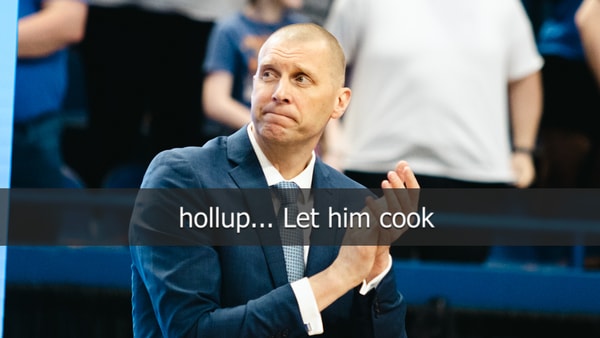
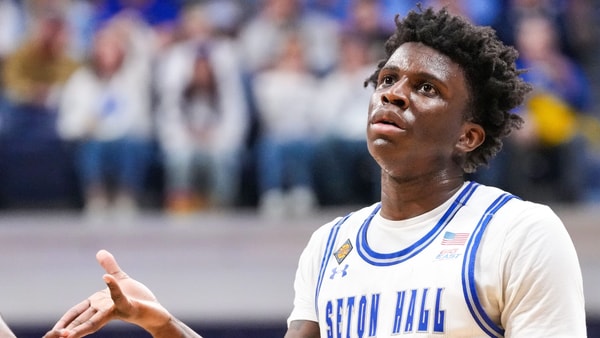
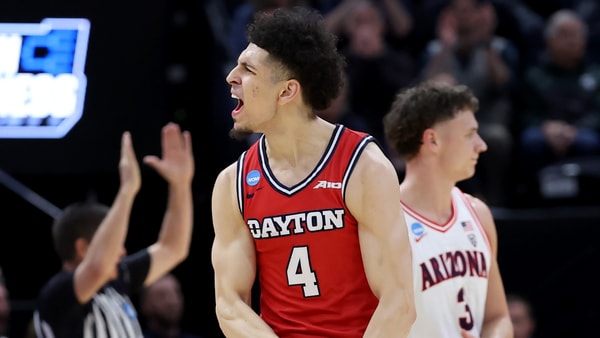
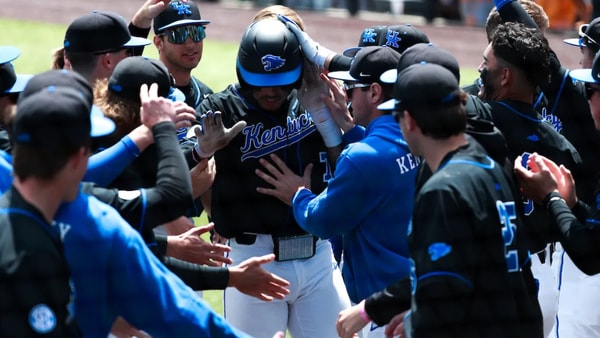
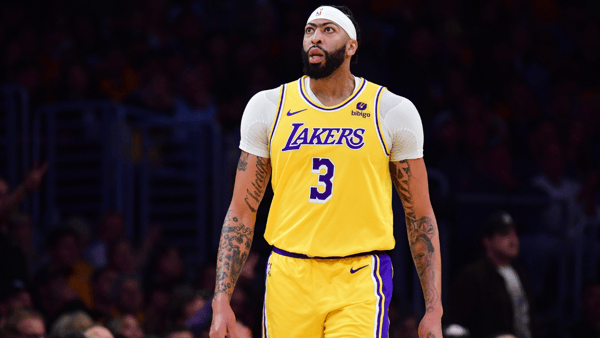
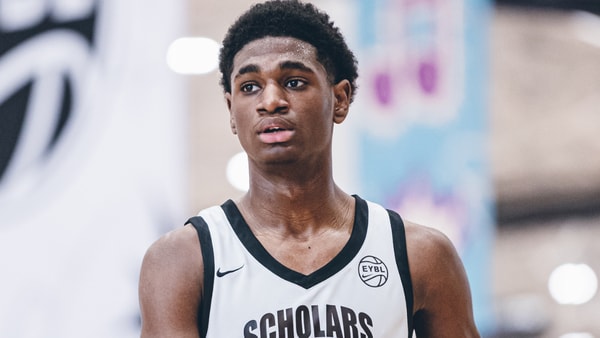
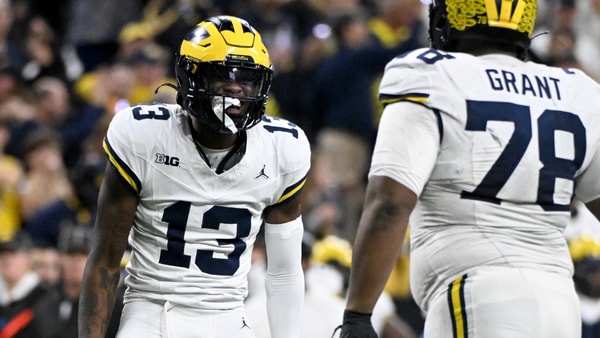
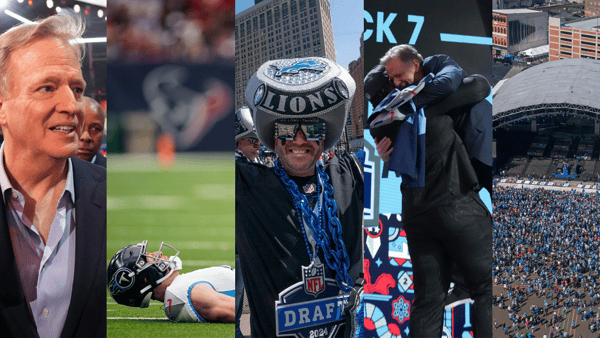
Discuss This Article
Comments have moved.
Join the conversation and talk about this article and all things Kentucky Sports in the new KSR Message Board.
KSBoard